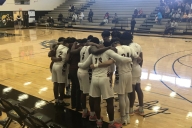You have /5 articles left.
Sign up for a free account or log in.
Georgia’s governor, Nathan Deal, on Monday signed into law a bill that allows public college and university athletic departments to avoid responding to open-records requests for up to 90 business days.
The change extends the time in which institutions must either produce the requested records or at least acknowledge the request from three days to more than three months. The amendment was quietly added to existing legislation designed to restrict public access to records about Georgia’s economic development projects after the University of Georgia’s head football coach, Kirby Smart, spent a day visiting the state capitol in March.
Open-records advocates this week expressed concern that existing open-records laws were amended simply because a college football coach may have suggested the change.
“I’m from Georgia,” said Frank LoMonte, executive director of the Student Press Law Center. “I know how important football is there. But the whole process is so troubling. It’s really alarming. Now that Georgia has established 90 days as the target, you can envision other states racing them to the bottom.”
Sponsors of the bill said it came in response to institutions being flooded with open-records requests designed to elicit information about college football recruiting practices, but the language of the amendment goes much further. Colleges can wait 90 days to respond to any athletics-related open-records request, including how much athletic departments are spending on travel for recruiting or on building new athletics facilities.
The amendment made an exception only for “salary information for nonclerical staff,” including that of coaches. The law applies to "any unit of the University System of Georgia, including athletic departments and related private athletic associations." That includes the University of Georgia, Georgia State University, the Georgia Institute of Technology and Augusta University.
A chief of staff of one of the bill’s co-sponsors told the Macon Telegraph that the idea “came to light through Kirby Smart at UGA.” During a news conference after a practice last month, Smart played down his involvement in the legislation, which has been nicknamed Kirby’s Law.
“When I went over to the capitol, I was asked what’s the difference in our program and some programs I’ve been at in the past,” said Smart, who was on the coaching staff at Alabama for a decade. "One of the things I brought up, there’s a difference. And that was the extent of my conversation with those guys about that. So for me to get the credit for that is a little bit misleading.”
Smart, who was hired in December at a $3.75 million salary, has already spent more than $500,000 chartering airplanes and helicopters to recruit players and hire staff. The university has defended the spending, which has increased under Smart compared to the team’s previous coach, Mark Richt.
Greg McGarity, Georgia’s athletics director, has voiced his support for the bill, saying that "it gives [the athletic department] a chance administratively to respond in a timely manner." The department has received nearly 100 open records requests since the start of December, McGarity said, and responding to so many requests makes it difficult to "handle [the department's] normal business."
The governor’s office and the bill’s sponsors maintain that the change is only meant to bring the state’s open-records laws closer to those of states with rival programs.
“This is an economic development bill, and the governor supported the inclusion of the language regarding athletics,” Jen Talaber Ryan, the governor’s spokeswoman, said Tuesday in an email. “It simply levels the playing field with other states that also have strong athletic programs like Georgia.”
Open-records experts said, however, that no other state allows public institutions to wait 90 days before responding to records requests about college athletics. LoMonte called the time frame “so unusual, it’s possibly unprecedented.”
Indeed, no other state in the Southeastern Conference allows 90 days for a response, and most states call for wait times between three to 15 days, though actually receiving requested records can take much longer. In Alabama, the state most frequently cited by supporters of the legislation, the law states that the time for responding to requests must be “reasonable.” None of the states have laws specifically carving out a longer wait times for athletics departments over other state agencies.
Before the Georgia Senate passed the bill in March, Casey Cagle, the state’s lieutenant governor, made clear why he supported the athletics amendment.
“I hope it brings us a national championship,” Cagle said.








